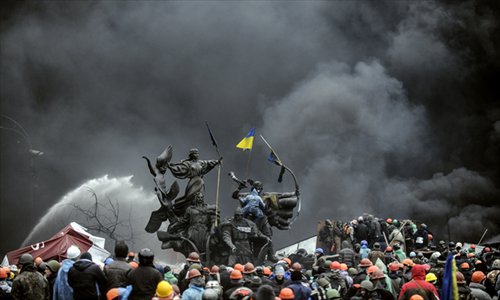Kiev death toll rises despite truce

Protesters stand behind barricades during a face-off against police on Thursday in Kiev. Photo: AFP
Related: Violent clashes continue in Ukraine, death toll rises
Fresh clashes broke out in Kiev on Thursday between protesters and police, killing dozens of people despite a truce announced by Ukrainian President Viktor Yanukovych hours earlier.
As the death toll keeps rising, foreign ministers from the European Union started discussing sanctions against those responsible for the violence.
Reuters reported that a draft ministerial statement indicates that the EU was also preparing to impose an arms embargo and a ban on equipment used for internal repression against Ukraine.
EU officials cautioned that the text was subject to revisions, as foreign ministers want to hear from French, German and Polish foreign ministers who are due to brief them on their talks in Kiev with Yanukovych.
The three diplomats, who had been expected to fly to Brussels but later decided to stay in Kiev for more talks, saw a chance for a compromise between the Ukrainian leader and opposition, Reuters quoted an EU source as saying.
Meanwhile, Russian media Thursday quoted Russian President Vladimir Putin's spokesman as saying that Putin decided to send an envoy to Ukraine to try to mediate talks between the government and opposition.
On Thursday morning, renewed fighting between thousands of protesters and police broke out with gunfire, detonations and black smoke billowing in central Kiev's Independence Square.
The BBC put Thursday's death toll at more than 20, while the opposition said more than 60 protesters died in the clashes. A presidential statement said dozens of police were dead or wounded.
The country's interior ministry Thursday said in a statement that "police have been given combat weapons, which will be used in accordance with the law." It also said protesters are holding 67 policemen hostage in Kiev.
The extensive demonstrations broke out in late November when the Ukrainian government surprised the West by rejecting a landmark trade deal with the EU. Soon Russia offered a $15 billion bailout deal and agreed to slash gas prices for Ukraine.
The turmoil highlighted the long-existing disagreement between the country's pro-European west and Russian-speaking east, and it is now a battle between Western countries and Russia as both sides have geopolitical uses for Ukraine, said Ding Peihua, a research fellow with the Institute of International Relations at the Shanghai Academy of Social Sciences.
Ukraine will benefit more from economic ties with Europe in the long term, but working with Russia obviously better serves their immediate interests, Ding added.
Besides, "there are a large number of extremists among the opposition, which allows the political process to be hijacked by terrorism," said Zhang Hong, an expert on Ukraine at the Chinese Academy of Social Sciences, noting that the EU and US siding with the opposition encouraged an escalation in violence.
Late on Wednesday, Yanukovych decided to conduct an anti-terrorist operation across the country and sacked a top general of the army.
Pressure on the Ukrainian government has been mounting. Washington declared Wednesday it would impose visa bans on about 20 Ukrainian government officials deemed responsible for the fighting on Tuesday.
In addition to external pressure, Volodymyr Makeyenko, Kiev's mayor, on Thursday resigned from Yanukovych's ruling Regions Party as a protest against the "bloodshed."
In response to mooted sanctions by the West, Russian Foreign Minister Sergei Lavrov on Thursday condemned the threats as an "attempt at bullying," AFP reported.
Russian Prime Minister Dmitry Medvedev also said Thursday Russia needs a strong government in Kiev and could only cooperate fully with Ukraine when its leadership was "in good shape."
Putin is not likely to make a concession because with a failing economy he needs strong diplomacy to gain people's support, Zhang said.
Besides, the Eurasia Union with which Russia intended to regain its position as an internationally influential power will not mean much without the participation of Ukraine. "In this case, the sanctions won't be decisive and the key to any solution to the crisis lies in whether the West can take a step back," Zhang said.
Agencies contributed to this story